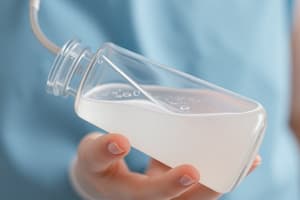Podcast
Questions and Answers
Which cause of fluid imbalance can also increase potassium levels, potentially leading to renal failure?
Which cause of fluid imbalance can also increase potassium levels, potentially leading to renal failure?
- Increased Sodium
- Diuretics
- Laxatives
- Potassium (correct)
What symptom is NOT typically associated with extracellular fluid volume deficit?
What symptom is NOT typically associated with extracellular fluid volume deficit?
- Increased heart rate (correct)
- Sunken eyes
- Increased thirst
- Confusion
Which risk factor is shared between infants and older adults for fluid imbalance?
Which risk factor is shared between infants and older adults for fluid imbalance?
- Diuretics
- Decreased muscle mass and weight (correct)
- Immature kidneys
- Increased respiratory rate
What is a recommended treatment for dehydration associated with hypokalemia?
What is a recommended treatment for dehydration associated with hypokalemia?
Which symptom is specific to extracellular fluid volume deficit but not necessarily to hypokalemia?
Which symptom is specific to extracellular fluid volume deficit but not necessarily to hypokalemia?
Which of the following is NOT a sign that should be monitored to prevent dehydration?
Which of the following is NOT a sign that should be monitored to prevent dehydration?
Flashcards are hidden until you start studying
Study Notes
Dehydration - Extracellular Fluid Volume Deficit
Signs and Symptoms
- Decreased blood pressure, heart rate, and weight
- Confusion and lightheadedness
- Dry mouth and increased thirst
- Dark urine and sunken eyes
- Fall risk due to dehydration
Nursing Interventions
- Administration of oral or intravenous (IV) fluids
- Monitoring of intake and output (I&O's)
- Regular vital signs (VS) checks
- Ensuring safety precautions
Causes and Risk Factors
- Diuretics as a cause of dehydration
- Decreased intake leading to dehydration
- Hypokalemia (electrolyte imbalance) with potassium levels between 3.5-5
- Cardiac issues related to decreased GI motility and low potassium levels
- Hypokalemia symptoms: muscle weakness, cramps, irregular heartbeat, fatigue, and severe paralysis
- Risk of arrhythmias with hypokalemia
Risk Factors for Fluid Imbalance
- Infants: high metabolic rate, immature kidneys, and increased respiratory rate
- Older Adults: tooth loss, decreased senses, diuretics, decreased muscle mass and weight, and decreased renal function
Causes of Fluid Imbalance
- Diuretics and increased sodium levels
- Non-invasive ventilation (NIV) and laxatives (abuse)
Management
- Potassium supplement administration
- Diet management with foods rich in potassium (e.g., bananas)
- Monitoring of intake and output (I&O's) and vital signs (VS)
- Ensuring safety precautions
Medications
- 0.9% Sodium: may cause hyperglycemia and fluid overload
- Lactated Ringer's: may cause fluid overload and electrolyte imbalance, requiring potassium level monitoring
Studying That Suits You
Use AI to generate personalized quizzes and flashcards to suit your learning preferences.



